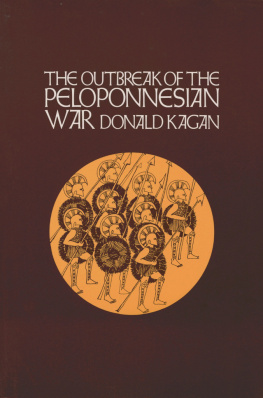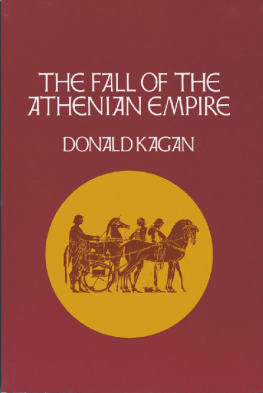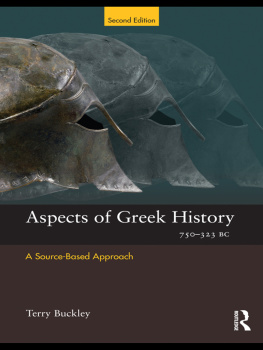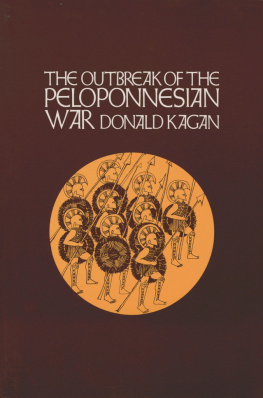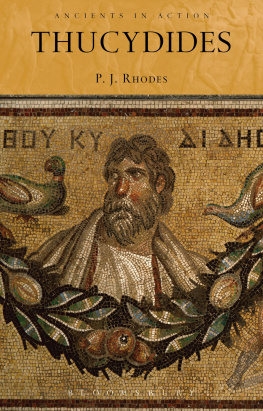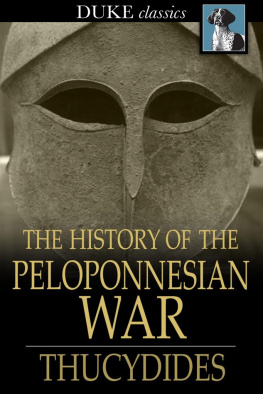Abbreviations and Short Titles
| AC | LAntiquit Classique |
| AHR | American Historical Review |
| AJA | American Journal of Archaeology |
| AJP | American Journal of Philology |
| ASI | E. Badian, ed., Ancient Societies and Institutions |
| ATL | B. D. Meritt, H. T. Wade-Gery, and F. M. McGregor, The Athenian Tribute Lists |
| BSA | Proceedings of the British School at Athens |
| Beloch, GG2 | K. J. Beloch, Griechische Geschichte, 2nd ed. |
| Bengtson, GG | H. Bengtson, Griechische Geschichte, 2nd ed. |
| Busolt, GG | Georg Busolt, Griechische Geschichte |
| Busolt and Swoboda, GS | Georg Busolt and Heinrich Swoboda, Griechische Staatskunde |
| CAH | Cambridge Ancient History |
| CP | Classical Philology |
| CQ | Classical Quarterly |
| CR | Classical Review |
| CW | Classical World |
| De Sanctis, SdG. | Gaetano De Sanctis, Storia dei Greci |
| FGrH | F. Jacoby, Die Fragmente der griechischen Historiker |
| Glotz and Cohen, HG | Gustave Glotz and Robert Cohen, Histoire Grecque, II |
| Gomme, Hist. Comm. | A. W. Gomme, A Historical Commentary on Thucydides |
| Grote | George Grote, A History of Greece |
| HSCP | Harvard Studies in Classical Philology |
| IG | Inscriptiones Graecae |
| JHS | Journal of Hellenic Studies |
| LCL | Loeb Classical Library |
| Meyer, Forschungen | Eduard Meyer, Forschungen zur alten Geschichte, II |
| Meyer, GdA | Eduard Meyer, Geschichte des Altertums |
| PACA | Proceedings of the African Classical Association |
| PW | Pauly-Wissowa and others, Realenzyklopcidie der klassischen Altertumswissenschaft |
| Riv. di fil . | Rivista di filologia e di istruzione classica |
| SEG | Supplementum Epigraphicum Graecum |
| SIG | W. Dittenberger, Sylloge Inscriptionum Graecarum |
| TAPA | Transactions of the American Phililogical Association |
| Tod | M. N. Tod, A Selection of Greek Historical Inscriptions to the End of the Fifth Century |
Appendixes
A. The Willingness of the Members of the Delian League to Accept Athenian Leadership
()
In the fourth century the same opinion was held not only by Isocrates ( De Pace 30, Paneg. 72, Panath. 67), who might have been prejudiced in favor of Athens, but also by the Spartans, who, according to Xenophon ( Hell. 6. 5. 34), admitted that the Athenians had been chosen for naval leadership by the allies with the approval of the Spartans. Aristotle ( Ath. Pol. 23. 2) has seemed to some scholars to argue against Spartan approval by saying that the Athenians took over the hegemony , and they have tried to emend the text to remove the difficulty. Gomme ( Hist. Comm., I, 272) is probably right in arguing against emendation and interpreting the phrase, Sparta being unwilling to keep the leadership. It is clear in any case that the official Spartan position was one of at least tacit approval. If Aristotles text is sound and to be interpreted in the more obvious way, then Aristode may be taking the opinion of the recently defeated war party to be the true attitude of the Spartans.
Meyer ( Historia, XII [1963], 405 ff.) has seized upon the statement of Herodotus . [ A] (8. 3), as the cornerstone of his theory that the formation of the Delian League was the culmination of an Athenian plan dating back at least to 481. His arguments are not convincing, but there is no reason to deny that by 478 the Athenians were more than willing to assume the leadership. Herodotus emphasizes their willingness, while Thucydides lays great stress on the initiative of the allies. Both may be right. As Sealey says: This difference of judgment and other such oddities doubtless reflect contemporary controversies. He goes on to say that the student who tries to reconstruct fifth-century history from fifth-century sources is in the position of a foreigner who visits a country and listens to citizens talking politics; at best a tenth of what he hears will be true. This last statement seems to me altogether too pessimistic. Thucydides and Herodotus were not merely two citizens discussing politics; they were learned men who had taken some pains to discover the facts. Their interpretations are not to be too readily discarded.
B. The Historicity of Diodorus Account of the Spartan Assembly in 475
()
Many modern scholars simply omit this story, presumably for the same reasons that Busolt denies its historicity ( GG, III: 1, 71, n. 1). For him, Die ganze Beratung ist augenscheinlich nur ein Erzeugnis der Phantasie des Ephoros. Grote ( A History of Greece [4th ed.; London, 1872] IV, 348, n. 1) accepts the conference and considers the role played by an influential Spartan named Hetoemaridas probable enough but like Busolt, he considers the speech merely an Isocratean commonplace invented by Ephorus. With what I hope is the higher naivet of this century, I believe in the conference, the decisive presence of Hetoemaridas, the general tenor of his remarks, and even in the accurate recollection of his words by the Spartan source of Ephorus. There is no doubt that Ephorus knew many true things that neither Herodotus nor Thucydides reports. In this period, which falls outside the main interest of both historians, the argument from silence is worthless. It is bad method to ignore the report of an ancient author that is not contradicted by another source, internally impossible, or self-contradictory. Thus, there is no reason to doubt the conference. It is impossible to imagine why Ephorus or his source should invent Hetoemaridas and attribute a leading role to him, for we know nothing else about him. So we should not doubt him or his important intervention in the discussion.
A. Andrewes ( ASI, 45) accepts the historicity of the meeting and the role of Hetoemaridas without question. The speeches, of course, like all speeches reported by ancient historians, are more suspicious and probably are not completely accurate reports of what the speakers said. Nonetheless, in this case I think Ephorus is reporting the general idea of the discussion correctly and even passes on some of the more striking phrases used by the speakers. The young men of the war party urged in favor of their unwillingness to give up rule of the sea an ancient oracle in which the god had warned them against a lame hegemony ( ). To abandon one of the two foundations of their leadership, they argued, would leave Sparta lame indeed. I believe this rare burst of eloquence became famous among the Spartans and was often repeated. Little more than a decade later, Cimon, the greatest philolaconian in Athens, who had named one of his sons Lacedaemonius, who admired Sparta and its way of life, and who had very close relations with Sparta, was called upon to argue in behalf of sending an Athenian expedition to help Sparta. He responded with unaccustomed eloquence, exhorting the Athenians not to leave Hellas lame nor see their city deprived of its yokefellow ( E ) (Plut. Cim. 16. 8). It appears that he put to good use in a different context a metaphor that he had heard from his Spartan friends. For an excellent discussion of the value of Ephorus-Diodorus as a source, see Mary Morse Fuqua, A Study of Character Portrayal in the History of Thucydides, unpublished doctoral dissertation Cornell University, Ithaca, N.Y., 1965, 1018.

